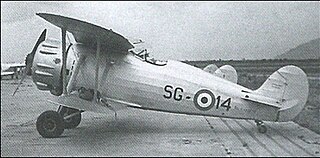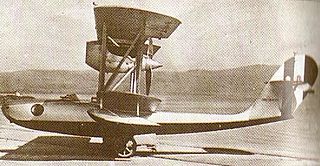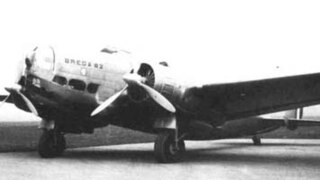
The Macchi C.200 Saetta, or MC.200, was a fighter aircraft developed and manufactured by Aeronautica Macchi in Italy. Various versions were flown by the Regia Aeronautica who used the type throughout the Second World War.

The Fiat CR.42 Falco is a single-seat sesquiplane fighter developed and produced by Italian aircraft manufacturer Fiat Aviazione. It served primarily in the Italian Regia Aeronautica in the 1930s and during the Second World War.

The Fiat CR.32 was an Italian biplane fighter used in the Spanish Civil War and the Second World War. Designed by the aeronautical engineer Celestino Rosatelli, it was a compact, robust and highly manoeuvrable aircraft for its era, leading to it being a relatively popular fighter during the 1930s.

The Fiat BR.20 Cicogna was a low-wing twin-engine medium bomber that was developed and manufactured by Italian aircraft company Fiat. It holds the distinction of being the first all-metal Italian bomber to enter service; at the time, it was regarded as one of the most modern medium bombers in the world.

The Fiat G.55 Centauro was a single-engine single-seat World War II fighter aircraft used by the Regia Aeronautica and the Aeronautica Nazionale Repubblicana in 1943–1945. It was designed and built in Turin by Fiat. The Fiat G.55 was arguably the best type produced in Italy during World War II, but it did not enter production until 1943, when, after comparative tests against the Messerschmitt Bf 109G and the Focke-Wulf 190, the Luftwaffe itself regarded the Fiat G.55 as "the best Axis fighter".

The Breda Ba.88 Lince ("Lynx") was a ground-attack aircraft used by the Italian Regia Aeronautica during World War II. Its streamlined design and retractable undercarriage were advanced for the time, and after its debut in 1937 the aircraft established several world speed records. However, when military equipment was installed on production examples, problems of instability developed and the aeroplane's general performance deteriorated. Eventually its operational career was cut short, and the remaining Ba.88 airframes were used as fixed installations on airfields to mislead enemy reconnaissance. It represented, perhaps, the most remarkable failure of any operational aircraft to see service in World War II.

The Breda Ba.65 was an Italian all-metal single-engine, low-wing monoplane used by Aviazione Legionaria during the Spanish Civil War and Regia Aeronautica in the first half of World War II. It was the only Italian ground-attack aircraft that saw active service in this role. It saw service almost exclusively in the North African and Middle-Eastern theatre. In addition to more than 150 aircraft operated by the Italian forces, a total of 55 were exported and used by the air forces of Iraq, Chile and Portugal.

The Breda Ba.64 was an Italian single-engine ground-attack aircraft used by the Regia Aeronautica during the 1930s.

The Fiat CR.20 was an Italian biplane fighter used during the 1920s and 1930s. Designed by Celestino Rosatelli, it represented an intermediate step from the early biplane CR.1 and the later, successful series CR.30, CR.32 and CR.42.

The Fiat CR.1 was an Italian biplane fighter aircraft of the 1920s. Of wood-and-fabric construction, it was designed by Celestino Rosatelli, from whom it gained the 'CR' designation. Its most distinctive feature was that the lower wings were longer than the upper ones.

The CRDA CANT Z.1018 Leone (Lion) was an Italian medium bomber of the 1940s.

The Breda Ba.201 was an Italian dive bomber designed during World War II, that never entered production.

The Caproni Vizzola F.5 was an Italian fighter aircraft that was built by Caproni. It was a single-seat, low-wing cantilever monoplane with retractable landing gear.

The IMAM Ro.41 was an Italian light biplane fighter aircraft, serving in the Regia Aeronautica in the 1930s-1940s, mainly as a trainer.

The IMAM Ro.51 was an Italian fighter aircraft that first flew in 1937. It was designed for the 1936 new fighter contest for the Regia Aeronautica, with practically all the Italian aircraft builders involved.

The IMAM Ro.57 was an Italian twin-engined, single-seat monoplane fighter of the Regia Aeronautica. Based on a 1939 design by Giovanni Galasso the aircraft did not enter production until 1943.

The CANT 25 was an Italian shipboard single-seat sesquiplane flying boat fighter that entered service with the Regia Aeronautica in 1931.

The Caproni Ca.355 Tuffo was a low-wing single-engine dive bomber, designed and built by the Italian Caproni company in 1941, which never proceeded beyond a single prototype. Derived from Ca.335 Mistral, the Ca.355 was proposed to equip the Regia Aeronautica, but it was found to offer little advantage over the German Junkers Ju 87 "Stuka" and the project was abandoned.

The Caproni Ca.331 Raffica was an Italian aircraft built by Caproni in the early 1940s as a tactical reconnaissance aircraft/light bomber and also as a night fighter.

The Breda Ba.82 was an Italian medium bomber prototype of the late 1930s; it was designed and built by the Breda company.






















